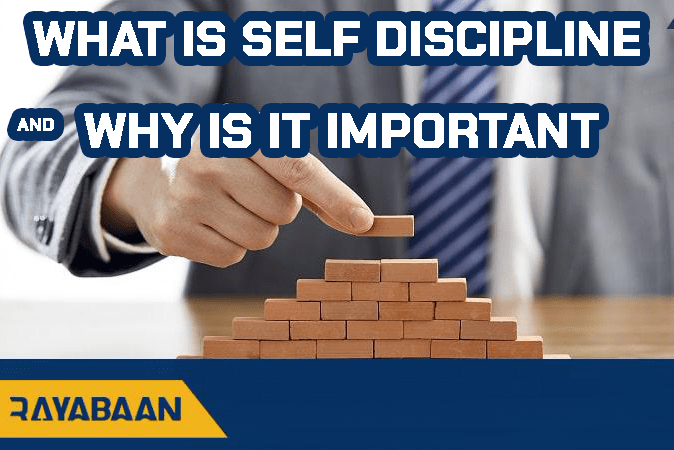What is self discipline and why is it important
What is self-discipline and why is it important
Self-discipline is the ability to focus intently on a task or goal with the intention of achieving specific results.
Before reading this interesting article, I suggest you watch the following video
As with other traits that may contribute to your overall success, self-discipline is a trait that ensures sustained success over time. Individuals with self-discipline usually rely on a group of characteristics, such as:
- high-mindedness
- Focus
- organization
- perseverance
- responsibility
- resilience
- Strong work ethic
- Self-discipline is the ability to do what you have to do.
- Self-discipline often means giving up comfort and temporary desires for long-term success.
- For example, if you want to get fit, you should make an effort to get long-term health and wellness benefits.
- Dr. Steve Peters explains in The Champ Paradox that we are what we want to be now.
- Our emotional mind prevents us from acting the way we need to to achieve our goals.
- Self-discipline gives us the ability to take rational action over emotional thoughts.

1. The principle of contradiction in self-discipline
When making any decision, two competing criteria usually influence our choice. Part of our brain processes emotions and prompts us to make decisions based on what makes us feel good. But there is another part of the brain that is analytical. This section evaluates logically and gently invites you to consider things that have logic.
2. Duties; The principle of purchasing in self-regulation
No matter how you define success, achieving it inevitably requires increasing your energy (somewhat physical) and emotional energy. Emotional intelligence is strengthened by following every action. Commitment is easy at first and then becomes difficult and reaches a climax or “pivot”.
3. Concentration; Theory of meticulousness in self-discipline
If you put a piece of paper on the asphalt on a hot summer day, nothing will happen to it, but if you put a magnifying glass between the paper and the sun, it will burn. why? Because the focus is power. If the sunlight is concentrated enough, it will provide enough energy to set the paper on fire. When the water is sufficiently concentrated, it can be cut into steel. The principle of zooming in focus only speaks to one of the most important facts of life: Focus is power.
4. Honesty; The principle of self-ordering
The principle of creating integrity says that all creation follows a powerful and simple process: you think it, you speak it, you act it and it happens.
What are self-discipline exercises?
This question arises for many people, what are self-discipline exercises? Making small activities a habit can help you become more self-disciplined at work.
Although the following exercises may not be specifically related to your work responsibilities, they can support your efforts to maintain a disciplined state of mind. The exercises that you can include in your daily planning are:
1. Meditate for 10 minutes every day
Meditation is a popular self-discipline practice that’s easy to incorporate into your daily routine. Meditation reduces stress and increases focus, both of which are necessary to achieve important work goals, and ultimately increase personal discipline.
2. To Personal discipline, make your bed
When you make your bed at the beginning of the day as the first task of self-discipline, you are starting your day by completing a task before going to work. The feeling of achieving a small achievement before starting the day can put you in a more productive and disciplined state of mind for self-discipline.
3. Eliminate distractions
When you are at work, try to avoid distractions that take your time and distract you from working towards your goal; For example, you can put your cell phone in a desk drawer, use monitoring apps or block social networks, or very simply, set a specific period on your calendar to focus on a certain task, all of these things will improve your discipline.
4. Practice gratitude
Take time in your day to appreciate small victories or happy moments. This will increase and keep your motivation high. You can write down 3 things you are grateful for at the end of each day. After 6 weeks, see how your self-discipline and motivation have been affected.
5. To increase self-discipline, keep your goals in front of your eyes
Writing down goals can increase your motivation to achieve more self-discipline. Write your goals on paper and place them on your desk or computer. Take time to celebrate small victories or short-term goals.
6. Remember that failure is necessary to achieve success
Self-discipline does not require perfectionism. There is nothing wrong with not reaching some of your goals or not being able to do the exercises properly. Failure is a natural part of success. The important thing is to keep moving forward and get closer to your goals. Acknowledge your failures, reward your victories and never give up.
We are waiting for your comments and experiences.


Excellent goods from you, man. I’ve understand your stuff previous to and you’re just too fantastic. I really like what you have acquired here, certainly like what you’re saying and the way in which you say it. You make it enjoyable and you still care for to keep it sensible. I cant wait to read much more from you. This is really a terrific website.
It is a pleasure and an honor that you like the articles on the website. Please share your comments on other articles with us
I got what you mean , appreciate it for posting.Woh I am pleased to find this website through google. “Money is the most egalitarian force in society. It confers power on whoever holds it.” by Roger Starr.